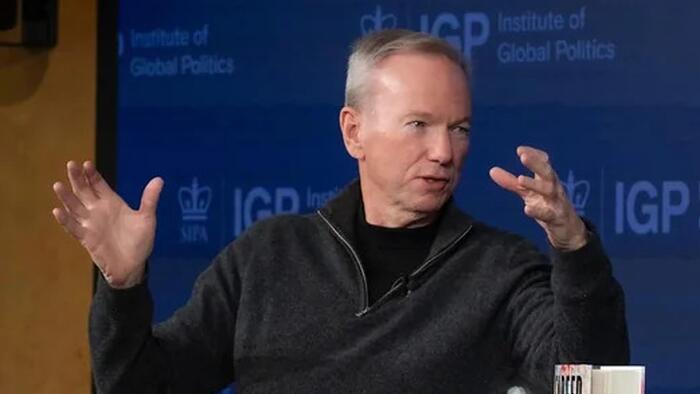


Former Google CEO Eric Schmidt issued a stark warning about the intensifying global race in artificial intelligence, and says that the U.S. is rapidly losing ground to China due to divergent strategies in developing advanced AI systems and integrating them into critical technologies.
In a fireside chat during the All-In Summit, Schmidt talked at length about the contrasting approaches, arguing that U.S. restrictions on chip exports have constrained China's pursuit of artificial general intelligence (AGI) but have not halted its progress in practical applications.
“I had thought that China and the United States were competing at the peer level in AI and that the good work that you have done and your predecessors did to restrict chips were slowing them down,” Schmidt said. “They're really doing something more different than I thought. They're not pursuing crazy AGI strategies partly because of the hardware limitations that you've put in place, but partly because the depth of their capital markets don't exist. They can't raise based on a wing and a prayer $100 million or maybe an equivalent to build the data centers. They just can't do it.”
Instead, Schmidt explained that China is focusing on embedding AI into practical applications, from consumer apps to robotics.
“The result is they're very focused on taking AI and applying it to everything,” the former Google CEO said. “And so the concern I have is that while we're pursuing AGI, which is incredibly interesting and we should talk about and all of us will be affected by this, we better also be competing with the Chinese in day-to-day stuff. Consumer apps."
Schmidt then highlighted China's robotics sector as a case study, drawing parallels to its success in electric vehicles.
“I saw all the Shanghai robotics companies and these guys are attempting to do in robots what they've successfully done with electric vehicles, right? And their work ethic is incredible,” Schmidt said. "They're well-funded. It's not the crazy valuations that we have in America. They can't raise the capital, but they can win across that.”
Schmidt also raised concerns about China's open-source strategy, which he sees as a geopolitical challenge.
“The other thing the Chinese are doing, and I want to emphasize this is a major geopolitical issue, is that my own background is open source," Schmidt said.
"Open weights means open training data. China is competing with open weights and open training data. And the US is largely and majority focused on closed weights, closed data,” he added. “That means that the majority of the world, think of it as the Belt and Road Initiative, are going to use Chinese models and not American models.”
As artificial intelligence reshapes the global economy, a cascade of eye-popping deals is pouring hundreds of billions of dollars into sprawling data-center empires, with OpenAI at the epicenter. The latest salvo came this week, as Nvidia committed up to $100 billion to the ChatGPT maker, a pact that underscores the sector's breakneck pace—and its mounting risks. Coupled with OpenAI and Softbank's $500 billion Stargate infrastructure push, these colossal investments are propelling U.S. tech giants into an unprecedented spending spree, even as skeptics warn of a frothy market driven more by hype than hard returns.
Ever since the Stargate project was announced, questions have swirled around whether Softbank has the funds to make it a reality. Others have pointed to the Nvidia-OpenAI deal as a negative signal for the latter.
“While the announcement is positive for OpenAI’s ability to ramp, we are concerned NVDA has become the ‘investor of last resort’, bailing out OpenAI’s overextended commitments,” D.A. Davidson analyst Gil Luria wrote in a recent research note.
Watch the entire interview below:
